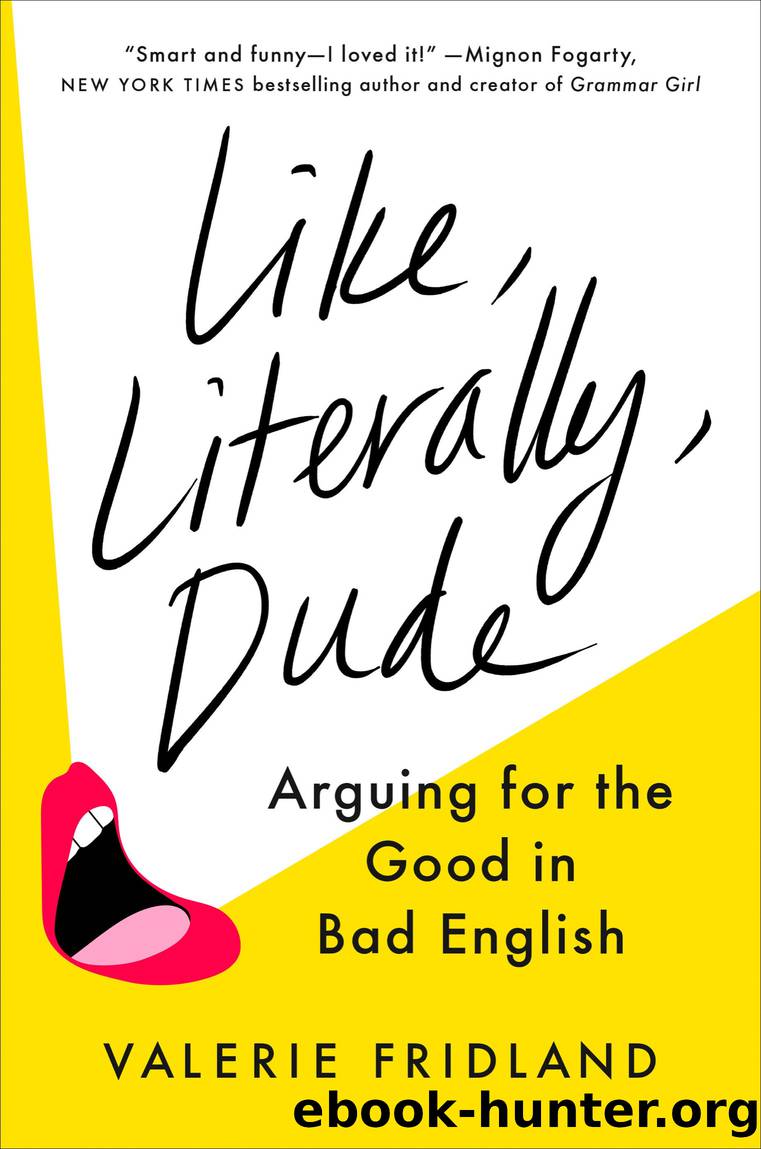Like, Literally, Dude: Arguing for the Good in Bad English by Valerie Fridland

Author:Valerie Fridland [Fridland, Valerie]
Language: eng
Format: epub
Publisher: Penguin Publishing Group
Published: 2023-04-18T00:00:00+00:00
Really is the new black
In a study looking at how Toronto teens used intensifiers, sociolinguist Sali Tagliamonte found that young speakers used comparatively more intensifiers as well as a rapidly evolving set of new ones. While stalwart very still hung around to some degree, it was now a reliable fallback rather than an intensifier of first choice. These newer intensifiers were associated with casualness and youth culture. After several hundred years of use, very has become blasé.
And what innovative new form came in to displace very? You might be surprised to find that it is none other than really, which can be found used sparingly as an intensifier as early as the eighteenth century. In comparison to very, really might be a neophyte but it is well on its way to becoming the latest in intensifier fashion. When we say language change in intensifiers is rapid that doesnât mean that the introduction of a new form instantly becomes the most popular. As with really, it sometimes takes a while to delexicalize to the point where, like very, the new intensifier loses almost all other associated meanings and is used widely and with essentially all adjectives and adverbs. Some, like horrifically, still carry for quite some time a modicum of their original sense, so we donât see them co-occur with words that donât have some natural affinity to this meaning; that is, you might say âhorrifically traumaticâ but not âhorrifically good.â Really might have taken about two hundred years to get here, but now studies looking at its frequency and distribution across modern speech corpora show that it has expanded to become, in essence, the new very.
Although Americans were embracing really as the new it-intensifier by the 1980s, the British took a bit longer to warm up. But research suggests that, for the under thirty-five set, really has now also emerged in Britain as a contender to knock very off its throne, sort of the new duchess of intensifiers. Very still reigns in more formal written contexts and among older speakers, but really has become the most popular intensifier in spoken contexts, and especially for young women.[*] Generally, older intensifiers stick around, but just get used less often. What might be more unexpected is that really has been found to increase along with education level, at least where it has been studied in this capacity. Along the same lines, in a study in Scotland by linguist Ronald Macaulay, intensifiers were more common in the speech of upper-class speakers, surprising perhaps given our sometimes jaded view of them. Macaulay hypothesized this stems from an upper-class tendency to want to provide a more evaluative take on what is being reported, something being very good, quite funny, or utterly dismal. Intensifiers have also been found to occur more often with emotional language (glad, scared) rather than descriptive words (red, thin), a fact that has been proposed as an explanation for what makes them more popular with women. In a study that examined how intensifiers
Download
This site does not store any files on its server. We only index and link to content provided by other sites. Please contact the content providers to delete copyright contents if any and email us, we'll remove relevant links or contents immediately.
| ASVAB | GED |
| GRE | NCLEX |
| PRAXIS | SAT |
| See more | Flash Cards |
| Study Guides | Study Skills |
| Workbooks |
Talking to Strangers by Malcolm Gladwell(13370)
The Compound Effect by Darren Hardy(8967)
Tools of Titans by Timothy Ferriss(8396)
Wonder by R. J. Palacio(8110)
The Lover by Duras Marguerite(7902)
A Court of Wings and Ruin by Sarah J. Maas(7847)
The Circle by Dave Eggers(7115)
Deep Work by Cal Newport(7083)
Kaplan MCAT General Chemistry Review by Kaplan(6933)
To All the Boys I've Loved Before by Jenny Han(5851)
Wiseguy by Nicholas Pileggi(5786)
The Body: A Guide for Occupants by Bill Bryson(5096)
Eat That Frog! by Brian Tracy(4540)
1,001 ASVAB Practice Questions For Dummies by Powers Rod(4505)
Cracking the GRE Premium Edition with 6 Practice Tests, 2015 (Graduate School Test Preparation) by Princeton Review(4293)
Pre-Suasion: A Revolutionary Way to Influence and Persuade by Robert Cialdini(4232)
Barron's AP Biology by Goldberg M.S. Deborah T(4150)
ACT Math For Dummies by Zegarelli Mark(4048)
Alive: The Story of the Andes Survivors by Piers Paul Read(4033)
